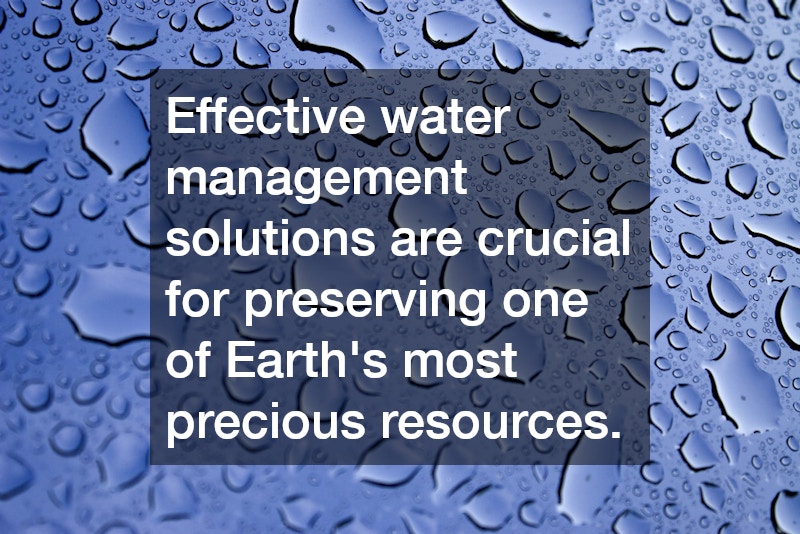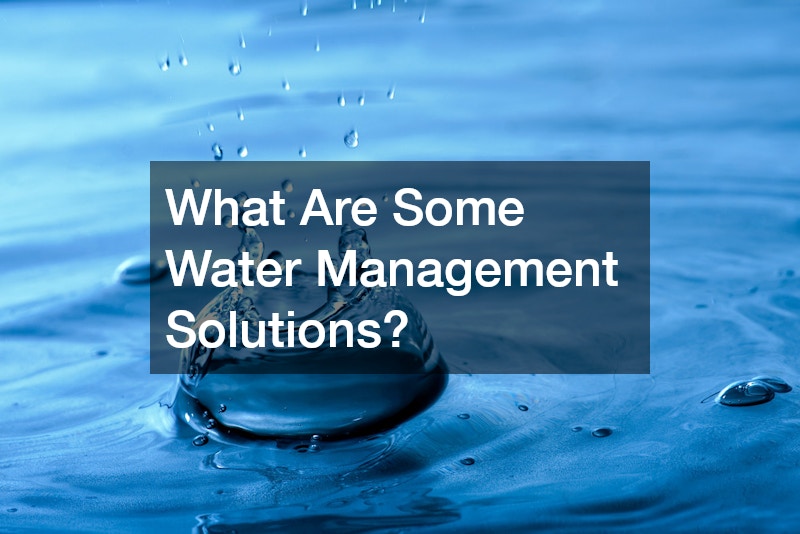What Are Some Water Management Solutions?

Water is one of the most vital resources on the planet, yet its availability is under constant pressure due to factors such as population growth, climate change, and inefficient usage. As a result, finding effective water management solutions is critical to ensuring that this resource is used sustainably and equitably. Whether for agricultural, industrial, or residential use, implementing smart water management strategies can reduce waste, improve efficiency, and protect water supplies for future generations.
Here are some of the most effective water management solutions currently available.
1. Rainwater Harvesting Systems
One of the most straightforward water management solutions is rainwater harvesting. This method involves collecting and storing rainwater for later use, reducing the demand on traditional water supplies. Rainwater can be collected from rooftops and other surfaces and stored in tanks or reservoirs. This water can then be used for non-potable purposes, such as irrigation, cleaning, or even flushing toilets, depending on the system’s setup.
Rainwater harvesting is particularly effective in areas with seasonal rainfall, as it allows homeowners, businesses, and municipalities to capture excess water during rainy periods and utilize it during drier seasons. This system is both cost-effective and environmentally friendly, reducing the need for processed water from municipal sources.
2. Gray Water Recycling
Gray water recycling is another efficient water management solution that can be implemented in residential and commercial settings. Gray water refers to relatively clean wastewater from sinks, showers, and laundry that can be treated and reused for non-potable purposes, such as landscape irrigation or toilet flushing.
By recycling gray water, households and businesses can significantly reduce the amount of fresh water they consume. Moreover, this solution reduces the volume of wastewater that needs to be treated, easing the burden on municipal water treatment plants.
3. Drip Irrigation Systems
In the agricultural sector, where water consumption is often high, drip irrigation systems provide a highly efficient solution. Traditional irrigation methods like sprinklers or flood irrigation can lead to significant water waste due to evaporation and runoff. Drip irrigation, however, delivers water directly to the root zone of plants, minimizing waste and ensuring that crops receive the exact amount of water they need.
Drip irrigation systems can be tailored to suit different types of crops, soil conditions, and climates, making it one of the most versatile water management solutions for farmers. Additionally, this method can help prevent soil erosion and reduce the need for fertilizers by delivering nutrients directly to plants.
4. Smart Water Meters
Smart water meters are an advanced water management solution that helps track water usage in real time. These devices can be installed in residential, commercial, or industrial settings to provide detailed data on water consumption, identify leaks, and detect inefficient usage.
By giving users greater insight into their water usage patterns, smart water meters encourage more responsible consumption. In urban areas, smart meters allow municipalities to monitor and manage water supplies more effectively, helping to prevent overuse and ensuring that water resources are allocated efficiently.
5. Desalination Plants
Desalination is the process of removing salt and other impurities from seawater to produce fresh water. While desalination plants have traditionally been expensive to build and operate, advances in technology are making them a more viable water management solution in arid regions where freshwater resources are scarce.
Desalination plants provide a sustainable way to increase freshwater supplies in coastal areas, helping to relieve pressure on overburdened rivers and aquifers. Though energy-intensive, ongoing innovations are making the process more efficient and less costly, allowing it to be a key part of future water management strategies.
Effective water management solutions are crucial for preserving one of Earth’s most precious resources. Whether it’s through rainwater harvesting, drip irrigation, or advanced technologies like smart water meters, these strategies offer practical ways to reduce water waste and promote sustainable use. By adopting these water management solutions, we can ensure that clean, accessible water remains available for future generations.
.








